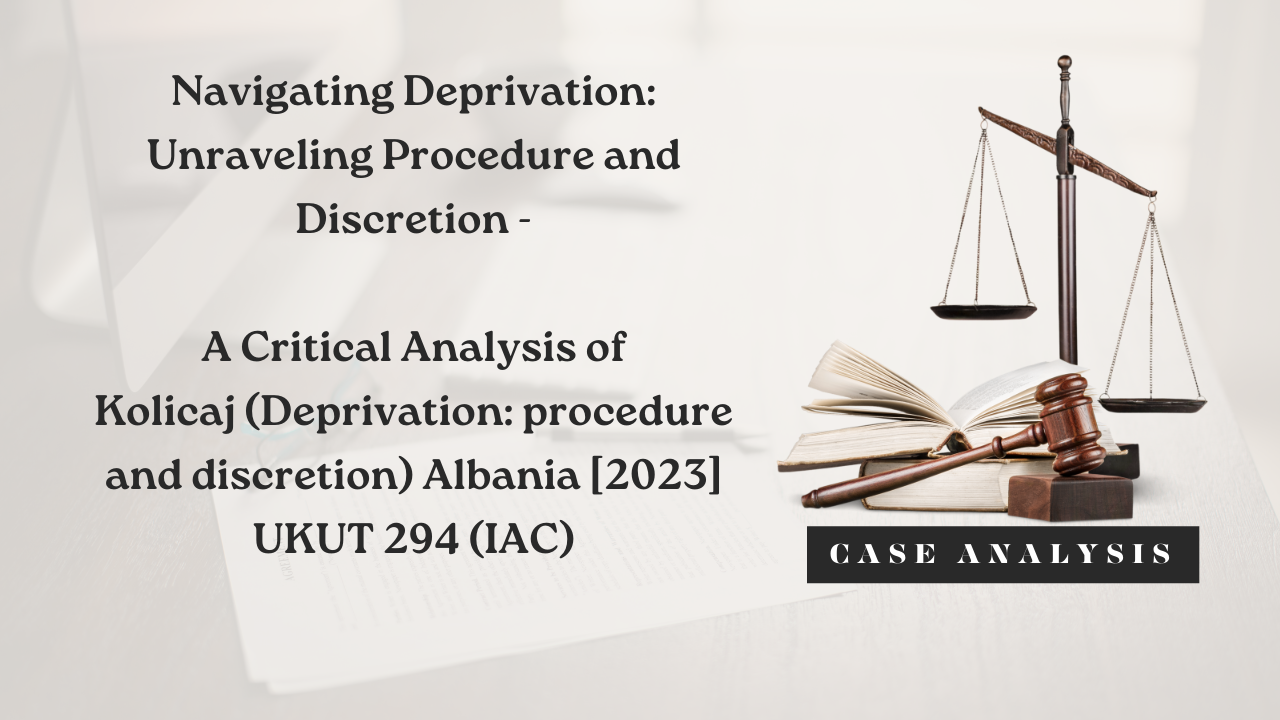Background
The appellant claimed the decision to strip his citizenship was flawed because he wasn’t notified or given a chance to present evidence against it. The First-tier Tribunal rejected this, stating there was no requirement for notice, citing practical reasons such as preventing the appellant from renouncing his other citizenship to avoid losing British citizenship. The tribunal argued that fairness didn’t necessitate prior notice for the appellant to respond to the potential deprivation order.
One of the issues which the appellant raised was that the HO’s decision was procedurally flawed because she failed to notify the appellant that she was considering exercising her power to deprive the appellant of his citizenship and provide him with an opportunity to offer evidence in response to this potential decision. The appellant argued if an opportunity was given he would have provided evidence to establish a lack of any propensity to reoffend. The FtT panel rejected this argument on the basis that the respondent didn’t need to make any inquiry into the issue of propensity to re-offend.
Furthermore, section 40(5) of the 1981 Act did not incorporate any requirement for giving notice of a potential decision within the statutory framework.
In the present case, the FtT panel considered that there were sound practical reasons for not notifying the appellant, namely that in the circumstances of an individual with dual nationality it would afford them the opportunity to renounce their other citizenship and thereby frustrate the opportunity to deprive them of their British citizenship since to do so after they had renounced their other citizenship would render them stateless.
The requirements of fairness did not therefore require the appellant to be allowed to respond to the fact that the respondent was minded to make a deprivation order in his case.
The UT rules that “….The Secretary of State might lawfully dispense with that step, however, where there is proper reason to believe that the individual would attempt to frustrate the process upon receipt of such notification.”
The legal foundation:
The power used by the respondent to deprive the appellant of his British citizenship in this case is provided by section 40(2) of the 1981 Act. This provides as follows:
“40(2) The Secretary of State may by order deprive a person of a citizenship status if the Secretary of State is satisfied that deprivation is conducive to the public good.”
This power is subject to the proviso under section 40(4) of the 1981 Act that an order may not be made using this power if the respondent is satisfied that it would make a person stateless unless section 40(4A) applies.
In addition to the type of case contemplated by section 40(2) of the 1981 Act, and for the sake of completeness, by virtue of section 40(3) of the 1981 Act the respondent is given the power to deprive a person of citizenship which has resulted from registration or naturalisation which was obtained by means of fraud, false representation or concealment of a material fact.
The present case was not, as appears from the facts set out above, concerned with either the power under section 40(3) or the proviso under section 40(4).
Section 40(5) of the 1981 Act contains a procedural requirement which is specified as follows:
“40(5) Before making an order under this section in respect of a person the Secretary of State must give the person written notice specifying-
(a) that the Secretary of State has decided to make an order,
(b) the reasons for the order, and
(c) the person’s right of appeal under section 40A(1)…”
The appeal procedure:
The right of appeal provided by section 40A of the 1981 Act is set out as follows:
“40A(1) A person-
(a) who is given notice under section 40(5) of a decision to make an order in respect of the person under section 40, or
(b) in respect of whom an order under section 40 is made without the person having been given notice under section 40(5) of the decision to make the order, may appeal against the decision to the First-tier Tribunal.”
The Supreme Court’s decision in the Begum case outlined the correct approach for appeals related to decisions made under section 40(2) of the British Nationality Act 1981. This approach was affirmed in subsequent cases, including Ciceri and Chimi. Chimi established a staged approach for evaluating such appeals:
- Determine if the Secretary of State erred in law in deciding that the conditions under section 40(2) or 40(3) were satisfied. If so, the appeal is allowed. If not,
- Examine whether the Secretary of State erred in law in deciding to exercise discretion to deprive the appellant of British citizenship. If so, the appeal is allowed. If not,
- Evaluate if the lawfully determined deprivation decision, when weighed against the foreseeable consequences for the appellant, is unlawful under section six of the Human Rights Act 1998. If so, the appeal is allowed on human rights grounds. If not, the appeal is dismissed.
In considering questions (1)(a) and (b), the tribunal must only consider evidence before the Secretary of State or relevant to establishing a pleaded error of law. However, for question (c), the tribunal may consider evidence not before the Secretary of State but cannot revisit conclusions reached for questions (1)(a) and (b).
Whether consideration of future risk is part and parcel of the assessment of being conducive to the public good for the appellant to be deprived of his citizenship.
In the judgement, the UT judge stated that “….Arden LJ in Pham v Secretary of State for the Home Department [2018] EWCA Civ 2064; [2019] Imm AR 296, emphasises that considering the risk of current harm is not always a prerequisite in the assessment of whether deprivation of citizenship is in the public interest. It is a matter of statutory interpretation, and there is no requirement for the respondent to factor in current harm as a condition for deeming deprivation conducive to the public good. Arden LJ also notes that satisfying the public good requirement can be achieved in various ways. While the respondent is not obligated to consider future harm when determining the condition precedent, it remains an option. The absence of consideration for the current risk of harm in the respondent’s decision in this case is deemed lawful. Although the respondent could have taken it into account, the decision not to do so does not constitute a legal error.”
Will it be procedurally unfair not to give the appellant prior notice of SSHd’s intention to deprive him of citizenship:
Perhaps the most important care here the case of R (Balajigari) v Secretary of State for the Home Department [2019] EWCA Civ 673; [2019] Imm AR 1152. In this case it was held “In the first place, although sometimes the duty to act fairly may not require a fair process to be followed before a decision is reached (as was made clear by Lord Mustill in the passage in R v Secretary of State for the home department ex p Doody [1994] 1 AC 531 which we have quoted earlier… fairness will usually require that to be done where that is feasible for practical and other reasons.”
The judge in this case concluded that the tribunal acknowledges that these concerns were serious and apparent enough to justify the decision-making approach taken by the respondent. In this specific case, providing the appellant with the chance to renounce his Albanian citizenship, thereby eliminating the possibility of the respondent stripping him of his British citizenship, justified the decision not to follow a procedure that would have allowed the appellant to comment on the concerns raised by the respondent.”….the requirements of fairness did not extend to providing the appellant with an earlier opportunity to make representations before the decision are those which have been set out above.”
Whether the SSHD should exercise discretion to deprive the person in question of their citizenship.
While considering this matter the UT judge took into account the judgement of Lord Diplock in the case of Secretary of State for Education and Science v Tameside Metropolitan Borough Council [1977] AC 1014, which was later summarised and reenforced in in the decision of the Divisional Court in R (on the application of Plantagenet Alliance Limited) v Secretary of State for Justice and others [2014] EWHC 1662 (QB); [2015] 3 All ER 261
The tribunal observed that there are concerns that there is no indication she was aware of or exercised her discretion in the appellant’s case. The briefing documentation presented various aspects, such as the appellant’s risk of future offending, the potential impact on his human rights, and the effect on his family, especially his children, which could be relevant to the exercise of the respondent’s discretion under section 40(2). However, these factors did not seem to play a role in the decision-making process. Instead, the respondent directly moved from assessing the seriousness of the offending to the conclusion that the appellant should be deprived of his citizenship, without recognising her discretion based on the overall circumstances of the case. While the respondent was not obligated to investigate the risk of future offending as a precondition, it was within the scope of her discretion to consider. By not exercising this discretion, the respondent committed a legal error, leading to the omission of crucial factors in the decision-making process.
The tribunal rejects the argument presented by the respondent that the decision, stating deprivation is conducive to the public good due to the appellant’s conviction, provides reasoning for both the condition precedent and the exercise of discretion. The tribunal asserts that such an interpretation would involve reading into the decision conclusions that are not explicitly present. The tribunal’s decision is based on the respondent’s clear failure to exercise discretion in this case. Even if the tribunal were to consider that discretion was exercised, the respondent’s submissions highlight the inadequacy of the reasons provided in the decision. The tribunal also dismisses the suggestion that the respondent should be interpreted as giving little weight to other factors presented during the decision-making process.
The reasons provided by the respondent did touch on the interests of the appellant’s children, but it seems the focus was on the respondent’s duty under section 55 of the Borders, Citizenship and Immigration Act 2009 rather than the discretion under section 40(2) of the 1981 Act. The tribunal is not convinced that this part of the decision, addressing the specific section 55 issue, addresses the concerns raised about the respondent’s decision-making. Therefore, the tribunal concludes that there is a legal error in the decision. Without the respondent exercising her discretion, it is not possible to determine the impact of this error on the final decision. Consequently, the decision of the First-tier Tribunal is set aside, and the appeal is allowed.
My take on the outcome of this case
This case of Kolicaj (Deprivation: procedure and discretion) Albania [2023] UKUT 294 (IAC) showed how citizenship deprivation matters are handled, bringing up some important points we need to think about.
The tribunal’s endorsement of the Secretary of State for the Home Department’s (SSHD) contention that prior notice might be dispensable in certain scenarios, coupled with the provision for the appellant to renounce dual citizenship, establishes a potentially far-reaching precedent. This precedent, if widely applied, could grant the SSHD significant latitude to revoke British citizenship without affording individuals the customary right to prior notice, particularly impacting naturalised foreign nationals holding dual citizenship.
The implications of this acceptance by the tribunal raise concerns about the erosion of procedural safeguards for individuals facing citizenship deprivation. The argument that providing notice could prompt individuals to renounce their other citizenships, thereby obstructing the SSHD’s ability to revoke British citizenship without rendering them stateless, introduces a precarious dynamic. This reasoning, while seemingly pragmatic, may inadvertently prioritise administrative expediency over the fundamental principles of procedural fairness.
However, the case also reminds us that the SSHD needs to be careful when using this power. It stresses the importance of looking at all the information carefully before making a decision. In simple terms, while this case might shape how similar situations are handled in the future, it also tells the SSHD to be cautious and fair in using this kind of decision-making power.
#CitizenshipDeprivation #LegalPrecedent #DueProcessMatters #ImmigrationLaw #IndividualRights #caseanalysis



